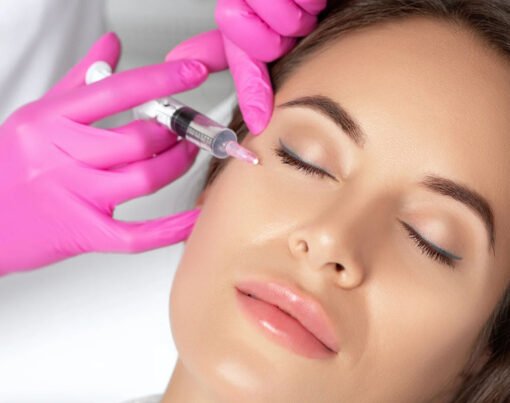Taking the plunge and booking an appointment for Juvederm is a big step. The first and most important thing to remember is that Juvederm can be used to treat many different facial features and skin types. Juvederm is a dermal filler that uses hyaluronic acid and collagen to plump, smooth, and improve elasticity in the skin.
Chances are you’ve seen celebs rocking their Juvederm-enhanced lips, cheeks, and other facial features, but before you book your appointment, it’s important to understand how the process works. In this article, I’ll break down the basics of Juvederm—what it is, how it works, what areas it can treat—and provide some tips on preparing for your treatment.
Table of Contents
What Is Juvederm?
Juvederm is a type of injectable cosmetic filler used to reduce the appearance of fine lines and wrinkles, as well as add volume to the face. It is made up of hyaluronic acid (HA), which naturally occurs in your body and binds with water to rejuvenate your skin.
In other words, it can help to smooth out wrinkles and lines, add volume to your cheeks or lips, and make your skin look more youthful. It’s one of the most popular injectables on the market because it provides results that look natural—and with proper maintenance, these results can last up to a year!
Juvederm is generally a safe procedure for all skin types, though you should be sure to consult with your dermatologist first before going through with it. That way you can discuss any potential side effects and find out if Juvederm is right for you.
What Are the Benefits of Juvederm?
Juvederm is an injectable filler used to reduce the appearance of wrinkles, restore facial volume, and enhance facial contours. It can be used to plump up thin lips, soften creases on the forehead or around the sides of your mouth, and decrease the look of vertical lip lines and hollowed cheeks.
The benefits of Juvederm include:
- Reduced wrinkles & fine lines: Juvederm can diminish wrinkles and folds caused by aging or sun damage.
- Enhanced facial contours & fullness: Juvederm can be used to add fullness to the cheeks, lips, temples, between brows and more. Its gel-like consistency is designed to give you a natural-looking result.
- Long-lasting results: With proper maintenance, Juvederm typically lasts between 8 – 12 months.
So if you’re looking for an effective way to rejuvenate your skin with lasting results, then Juvederm may be the perfect choice for you!
How Long Does Juvederm Last and What Is the Recovery Time?
If you’re considering getting Juvederm, you’re probably wondering how long it will last and what the recovery time is.
Generally speaking, Juvederm usually lasts six to twelve months, depending on a few different factors. Some individuals may need touch-ups more frequently while others may need less often. This is why it’s important to consult with a qualified healthcare professional to find out the best approach for your individual case.
When it comes to recovery time, Juvederm typically has minimal downtime. You may experience some mild soreness, redness, and swelling for a few days after the procedure but this should go away quickly and won’t have any lasting effects.
It’s also important to note that Juvederm is only intended for use on adults, so if you’re under 18 years old, you won’t be able to get this treatment. Additionally, you should always talk with a doctor before having any type of cosmetic procedure to make sure it’s right for you and that there are no contraindications that could lead to an adverse reaction.
What Are the Risks and Possible Side Effects of Juvederm?
Before you get Juvederm, it’s important to be aware of the risks and potential side effects. Generally, Juvederm is considered safe when administered by a qualified physician, however the risk of any procedure should not be taken lightly.
Common side effects include:
- Redness, swelling, bruising or itching at the injection site
- Pain during injection process
- Possible lumps, bumps under the skin
- Swelling around lips or eyes, which may cause short-term blurred vision
- Rarely an infection if sterility is not maintained during treatment.
It’s also important to note that Juvederm is made from a naturally occurring molecule in the body, hyaluronic acid (HA), and so allergic reactions are rare but can occur. Allergic reactions can be managed with antihistamines and other medications prescribed by your doctor.
If you have any other concerns about the safety and potential side effects of Juvederm, do not hesitate to discuss them with your doctor prior to receiving treatment.
Can I Combine Juvederm With Other Treatments?
What if you want to combine Juvederm with other treatments? Absolutely. You can combine Juvederm with other injectables, like BOTOX, as well as laser skin resurfacing, microneedling, or chemical peels, to get the results you’re looking for.
You can customize your Juvederm treatment to your specific needs; for example, if you’re dealing with wrinkles but would also like to add some volume back into your cheeks, your doctor can help find the perfect combination of products and techniques.
When it comes to combining treatments, it’s important that you have a plan in place with your doctor. Together you can discuss the goals of your treatment plan and create a tailored approach that will deliver the best results for you. This way, you won’t have to worry about any unnecessary complications down the line!
What Questions Should I Ask My Healthcare Provider About Juvederm?
Before you get Juvederm, it’s important to ask your healthcare provider a few questions. Here are some of the most important inquiries you should make before getting Juvederm:
- What type of Juvederm treatment is best for me? Depending on your skin type and the area being treated, different types of Juvederm may be better suited for you.
- What are the possible side effects of Juvederm? It’s important to understand how your skin may react to the Juvederm treatment, so make sure to ask about any potential side effects.
- How long will the results last? It’s important to know how long you can expect your results to last so that you can plan accordingly.
- What will my recovery look like? Ask what kind of care and precautions you should take after the treatment in order to ensure that your skin continues to heal properly.
By asking these questions, you can feel more confident about getting started with Juvederm, allowing for a better experience with smoother and longer lasting results.
Conclusion
Ultimately, deciding whether or not to get Juvederm requires careful consideration and consultation with a specialist. It’s important to weigh all the risks associated with the procedure and make sure you are comfortable with the results.
Whether you decide to go ahead or not, it’s always a good idea to take steps to maintain a healthy lifestyle, wear sunscreen, and stay out of the sun as much as possible to keep your skin looking its best.
Juvederm can be a safe and effective way to restore a youthful appearance, whether it’s minimizing facial wrinkles or plumping your lips. By doing your research and finding a qualified professional, you can make sure you make an informed decision about whether Juvederm is right for you.










